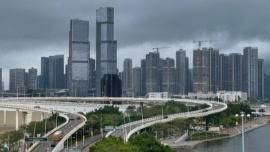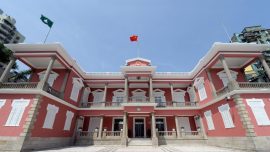As Macau endeavours to establish itself as a prime destination for performances and concerts to drive its tourism development, a significant hurdle emerges: the public’s struggle to obtain concert tickets due to the presence of ticket scalpers and scammers. Potential solutions to address these issues include revising laws, implementing real-name verification for ticket purchases, and an integrated ticketing platform, observers say
By Tony Lai
135
– No. of online scams associated with concert tickets in Jan-Sept 2023
Kitty Wong still felt like she was in heaven for days after attending the concert of the South Korean boyband Seventeen, one of her idols, held in Macau in January. All the hassle of securing the tickets weeks in advance was truly worth it. “I had three devices ready—my phone, MacBook, and iPad—to log onto the ticketing website precisely at 10 am on the day of the public sale,” recalls Ms. Wong, a local university student.
She had also requested that her parents and boyfriend do the same, anticipating heavy website traffic that could make it challenging to secure tickets before they were sold out. “After waiting for about 20–30 minutes, my MacBook finally logged onto the site. It was such a relief,” she adds.
However, not all Seventeen fans were as fortunate as Ms. Wong. Some had to explore unofficial ticketing channels, such as scalpers, in their quest to meet their idols. These fans not only had to pay inflated prices for the tickets, with media reports suggesting that Seventeen Macau concert tickets were reselling for as much as ten times the original price, but some also fell victim to scams.
According to the Macau Judiciary Police (PJ), they received a minimum of 25 reported cases related to ticket scams associated with the Seventeen concert that took place in Macau for two nights. The victims included both Macau residents and tourists, with a notable number being from Mainland China, and the majority of them were youngsters, the police said. These victims collectively suffered a total loss of HK$90,000, with the largest individual loss in a single case exceeding HK$12,000.
In most instances, the scammers used social media platforms to assert that they possessed sold-out tickets for popular concerts, and they would promise to meet the victims in person to deliver the tickets after receiving payment, the PJ said. But once the victims made a partial deposit or paid the full amount, the scammers would sever all contact, leaving the victims in a state of distress.
“To effectively curb scalping activities, a multifaceted approach is necessary. In addition to laws and penalties, it is also crucial to improve ticketing rules and methods such as implementing a real-name ticketing system, increasing the proportion of public sale, and enhancing transparency.”
– Macau Government

Capital of concerts
And this type of illicit activity has seen a significant increase in the past 12 months, coinciding with the attraction of regional and international pop stars and artists to host concerts in Macau, including Korean pop sensation Blackpink, global pop icon Bruno Mars, and Hong Kong Canton pop legends Jacky Cheung and Eason Chan. Since the easing of COVID-related travel restrictions in early 2023, concerts and shows have become integral to Macau’s efforts to revive tourism. In fact, nearly 1,200 concerts and shows were held in the city last year.
Given the thriving concert scene, there were 135 reported cases of online scams associated with concert tickets in the first three quarters of 2023. This represents a surge of 132 cases compared to the same period in 2022 and 113 cases compared to the same period in 2019, as per the latest figures from the Macau Secretariat for Security.
Legislator Ma Io Fong believes that the city should implement additional measures to curb the activities of concert scalpers and scammers, as the Macau government aims to transform the territory into a capital of entertainment, performances, and a sports hub. “The authorities should take the lead in regulating and supervising ticketing activities, while also improving mechanisms for reporting incidents of scams and scalpers,” he explains.
As the number of concerts and shows in Macau is expected to continue rising, the authorities should enhance public awareness regarding ticket scams, scalpers, reporting channels, and personal data protection, the lawmaker suggests. Additionally, he proposes the use of innovative technological solutions to monitor online ticket scalping and scamming activities.
“It is also crucial for the administration to review the existing legal framework related to ticket scalping, increasing the penalties for these illegal activities to strengthen deterrence,” adds Mr. Ma.
“It is also crucial for the administration to review the existing legal framework related to ticket scalping, increasing the penalties for these illegal activities to strengthen deterrence.”
– Legislator Ma Io Fong

Law enforcement
Ticket scalping is considered illegal in Macau and falls under the offence of “unlawful pricing,” as stated in the “Legal System for Offences Involving Public Health and the Economy”, and this offence carries a maximum penalty of three years’ imprisonment. However, critics argue that this law, enacted in 1996, should be updated to align with the modern trend of online ticket sales. Moreover, scalping tickets and engaging in ticket scams also violate certain provisions of the “Computer Crimes Act” and the “Criminal Code”.
In response to the increasing number of such offences, the authorities have stated their intention to review the “Legal System for Offences Involving Public Health and the Economy” to determine if updates are necessary. “The SAR government closely monitors scalping activities and scams related to concerts and large-scale performance tickets. Relevant government departments are continuously implementing preventive measures, promotional campaigns, and educational initiatives to combat these illicit activities,” the administration recently stated in response to inquiries from legislators.
One example of these efforts is the close communication maintained between the Public Security Police Force and concert venues regarding ticket sales, the statement read. Venue security departments will report any scalping activities in the vicinity to the police; on the day of the concerts, the police will deploy uniformed and plainclothes officers for inspection and patrol around the venue. The Judiciary Police also collects intelligence through both online and offline channels on such activities and cracks down on ticket scalping facilitated by the use of online bots, the statement added.
“Technological means like artificial intelligence (AI) can help quicken the process [of verifying ticket holder information].”
– Alan Ho Hoi Ming, president of the Macau Association of Convention, Exhibition & Tourism Sectors

Real-name verification
“To effectively curb scalping activities, a multifaceted approach is necessary,” the government emphasised in the reply. “In addition to laws and penalties, it is also crucial to improve ticketing rules and methods, such as implementing a real-name ticketing system, increasing the proportion of public sales, and enhancing transparency. These measures can help deter scalping and reduce the risks of scams.”
A real-name ticket purchase and entry system was implemented in Mainland China last year for commercial shows and events with an audience of over 5,000 people in a bid to crack down on ticket scalpers. Under this system, each identification card holder is limited to purchasing one ticket per show, and the personal details of the ticket holder must match the individual entering the venue on the day of the event. Additionally, mainland authorities require that the number of tickets sold to the public for these shows and events not be less than 85 percent of the venue’s capacity.
Similar mechanisms have been adopted in various concerts and shows held in various jurisdictions, such as Japan, Europe, and America. However, this approach is relatively new to Macau and has only been implemented once during the concerts featuring renowned Japanese composer and maestro Joe Hisaishi last year. Due to high ticket demand and instances of tickets being resold at significantly higher prices online at the time, the concert organiser, the Macau Cultural Affairs Bureau, required real personal identification for ticket purchases for Hisaishi’s shows.
Alan Ho Hoi Ming, the president of the Macau Association of Convention, Exhibition & Tourism Sectors, acknowledges that the real-name purchase mechanism may not be applicable to all concert tickets, as organisers often reserve tickets for yet-to-be-known sponsors and special guests. “But it is possible for this to happen on public ticket sales,” he adds.
While there are worries that it might take time for audience admission if their personal identification documents have to be checked to match with the ticketing information, he remarks, “Technological means like artificial intelligence (AI) can help quicken the process.” Furthermore, it is recommended that concert organisers could enhance the transparency of ticketing information and increase the ratio of public sales, which currently account for up to 80 percent of all ticket sales for a concert.
Integrated ticketing platform
In the 2024 Policy Address, the Macau government proposed the establishment of an “Event Ticketing Platform” within the current year, which aims to integrate ticketing services for cultural performances, sports events, and competitions in the city. The administration stated that this initiative will help contribute to the development of event brands, promote the professionalisation of Macau’s cultural industry, and create favourable conditions for hosting more large-scale cultural, entertainment, and sports events.
Mr. Ma, the lawmaker, believes that the authorities can leverage this platform to introduce real-name verification for ticket sales in the city. “This mechanism can be piloted on concerts, shows, and events organised by the government first,” he says. “It can also continue to gather opinions from the private sector on the matter [real-name mechanism] and provide support for the industry for the implementation of such a mechanism, for instance, via this ticketing platform.”
For university student Kitty Wong, she also agrees with the introduction of real-name registration for ticket purchases or any other measures to rein in the activities of ticket scalpers. “As long as it’s easier and more convenient for those who really appreciate and love the singers or artists to buy tickets, I welcome any possible measures,” she says.
























